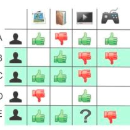Recommender systems may be confounded by various types of confounding factors (also called confounders) that may lead to inaccurate recommendations and sacrificed recommendation performance. Current approaches to solving the problem usually design each specific model for each specific confounder. However, real-world systems may include a huge number of confounders and thus designing each specific model for each specific confounder is unrealistic. More importantly, except for those "explicit confounders" that researchers can manually identify and process such as item's position in the ranking list, there are also many "latent confounders" that are beyond the imagination of researchers. For example, users' rating on a song may depend on their current mood or the current weather, and users' preference on ice creams may depend on the air temperature. Such latent confounders may be unobservable in the recorded training data. To solve the problem, we propose a deconfounded causal collaborative filtering model. We first frame user behaviors with unobserved confounders into a causal graph, and then we design a front-door adjustment model carefully fused with machine learning to deconfound the influence of unobserved confounders. The proposed model is able to handle both global confounders and personalized confounders. Experiments on real-world e-commerce datasets show that our method is able to deconfound unobserved confounders to achieve better recommendation performance.
翻译:建议系统可能被可能导致建议不准确和牺牲建议性表现的各类混乱因素(也称为混乱者)所混淆。目前解决问题的方法通常为每个具体的混乱者设计每一种具体模式。然而,现实世界系统可能包括大量混乱者,因此为每个具体的混乱者设计每一种具体模式是不现实的。更重要的是,除了研究人员可以人工识别和处理诸如项目在排名列表中的位置等各种“极端混乱者”之外,还有许多“相对混乱者”超出了研究人员的想象力。例如,对一首歌的用户评级可能取决于他们当前的情绪或当前天气,用户对冰淇淋的偏好可能取决于空气温度。这些潜在的混淆者可能在记录的培训数据中无法观测到。为了解决问题,我们提出一个“有缺陷的因果关系的协作性合作过滤模型”。我们首先将与不易察觉的困惑者的行为设置成一个因果关系图表,然后我们设计一个仔细结合机器学习的门面调整模型,以便了解不折不折不折不扣的全球经济方法的影响。这个模型是用来分析真实的实验性模型,用来分析个人方法。




